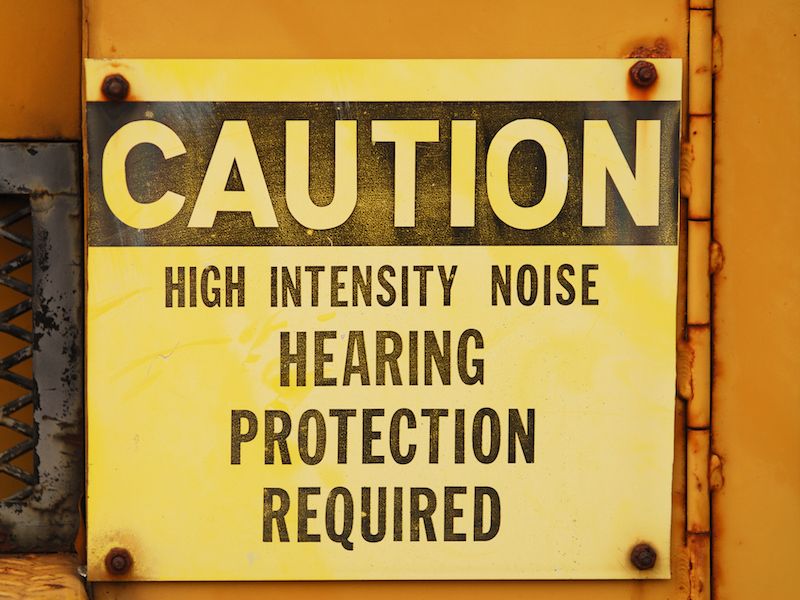
It’s one thing to realize that you should protect your hearing. It’s a different story to know when to safeguard your hearing. It’s not as straight forward as, for example, recognizing when to use sunblock. (Is it sunny and will you be outside? Then you need sunscreen.) Even knowing when you need eye protection is easier (Working with hazardous chemicals? Doing some building? You need to wear eye protection).
When dealing with when to wear hearing protection, there seems to be a big grey area which can be risky. Frequently, we’ll defer to our normal tendency to avoid hearing protection unless we have information that a specific place or activity is hazardous.
Determining The Risks
In general, we’re not very good at assessing risk, especially when it comes to something as intangible as permanent hearing damage or loss of hearing. To prove the point, here are some examples:
- Person A goes to a very loud rock concert. The concert lasts around 3 hours.
- A landscaping business is run by person B. After mowing lawns all day, she goes home and quietly reads a book.
- Person C is an office worker.
You may think that person A (let’s call her Ann, to be a little less clinical) might be in more hearing danger. Ann leaves the show with her ears ringing, and she’ll spend most of the next day, struggling to hear herself speak. It seems rational to presume that Ann’s activity was rather risky.
Person B (let’s call her Betty), on the other hand, is subjected to less noise. There’s no ringing in her ears. So her hearing must be safer, right? Not really. Because Betty is pushing that mower every day. So despite the fact that her ears don’t ring out with pain, the injury accrues gradually. If experienced on a regular basis, even moderately loud noise can have a harmful affect on your hearing.
What’s happening with person C (let’s call her Chris) is even harder to sort out. Most people realize that you need to protect your ears while running equipment such as a lawnmower. But even though Chris has a fairly quiet job, her long morning commute on the train every day is rather loud. Also, although she works behind her desk all day, she listens to her music through earbuds. Is protection something she should consider?
When is it Time to be Concerned About Protecting Your Ears?
Generally, you need to turn down the volume if you have to raise your voice to be heard. And you need to think about using earplugs or earmuffs if your surroundings are that loud.
So to put this a little more scientifically, you should use 85dB as your limit. Sounds above 85dB have the capacity to cause damage over time, so in those scenarios, you need to think about using hearing protection.
Your ears don’t have their own sound level meter to warn you when you get to that 85dB level, so many hearing specialists recommend obtaining specialized apps for your phone. You will be able to take the appropriate steps to safeguard your ears because these apps will inform you when the noise is getting to a hazardous level.
A Few Examples
Even if you do get that app and bring it with you, your phone may not be with you everywhere you go. So a few examples of when to protect your ears may help you develop a good standard. Here we go:
- Exercise: You know your morning spin class? Or maybe your evening workout session? You may think about using hearing protection to each one. Those instructors who make use of sound systems and microphones (and loud music) to motivate you might be good for your heart rate, but all that loudness is bad for your ears.
- Household Chores: We already discussed how something as straightforward as mowing the lawn, when done often enough, can require hearing protection. Chores, like mowing, are probably something you don’t even think about, but they can lead to hearing damage.
- Using Power Tools: You recognize you will want hearing protection if you work all day in a factory. But how about the hobbyist building in his workshop? Even if it’s just a hobby, hearing specialists suggest using hearing protection if you’re operating power equipment.
- Commuting and Driving: Driving all day as an Uber or Lyft driver? Or maybe you’re riding the subway after waiting for a while downtown. The noise of living in the city is bad enough for your ears, not to mention the added damage caused by cranking up your music to drown out the city noise.
- Listening to music with earbuds. OK, this doesn’t call for protection but does require care. Pay attention to how loud the music is, how long you’re listening to it, and whether it’s going directly into your ears. Noise-canceling headphones are a smart choice to prevent needing to turn the volume way up.
These examples may give you a suitable baseline. When in doubt, however, you should choose protection. Compared to leaving your ears exposed to future injury, in most circumstances, it’s better to protect your hearing. Protect today, hear tomorrow.

